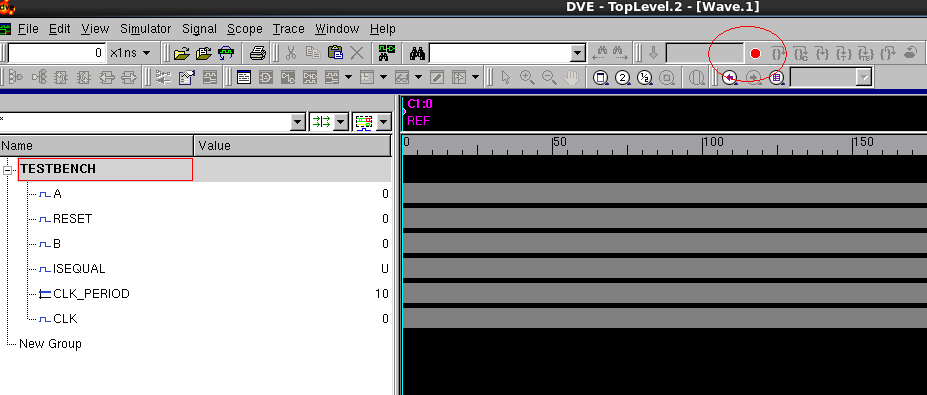使用VCS MX仿真VHDL
使用VCS MX仿真VHDL分为4步,我用的是VCS 2009.06。
1.“Step 1: Setting Up The Environment”
2.“Step 2: Analysis”
3.“Step 3: Elaboration”
4.“Step 4: Simulation”
下面使用一个具体的例子来分析:
isequal.vhd文件:
library ieee; use ieee.std_logic_1164.all; entity compab is port( clk: in std_logic; reset: in std_logic; a,b: in std_logic; isequal: out std_logic); end compab; architecture rtl of compab is begin comp: process(a, b) begin if a = b then isequal <= '1'; else isequal <= '0'; end if; end process comp; end rtl;
testbench.vhd文件:
LIBRARY ieee;
USE ieee.std_logic_1164.ALL;
-- Uncomment the following library declaration if using
-- arithmetic functions with Signed or Unsigned values
--USE ieee.numeric_std.ALL;
ENTITY testbench IS
END testbench;
ARCHITECTURE behavior OF testbench IS
-- Component Declaration for the Unit Under Test (UUT)
COMPONENT compab
PORT(
clk : IN std_logic;
reset : IN std_logic;
a : IN std_logic;
b : IN std_logic;
isequal : OUT std_logic
);
END COMPONENT;
--Inputs
signal clk : std_logic := '0';
signal reset : std_logic := '0';
signal a : std_logic := '0';
signal b : std_logic := '0';
--Outputs
signal isequal : std_logic;
-- Clock period definitions
constant clk_period : time := 10 ns;
BEGIN
-- Instantiate the Unit Under Test (UUT)
uut: compab PORT MAP (
clk => clk,
reset => reset,
a => a,
b => b,
isequal => isequal
);
-- Clock process definitions
clk_process :process
begin
clk <= '0';
wait for clk_period/2;
clk <= '1';
wait for clk_period/2;
end process;
-- Stimulus process
stim_proc: process
begin
-- hold reset state for 100 ns.
wait for 100 ns;
wait for clk_period*10;
-- insert stimulus here
wait;
end process;
a_process :process
begin
a <= '0';
wait for 20 ns;
a <= '1';
wait for 20 ns;
end process;
b_process :process
begin
b <= '0';
wait for 15 ns;
b <= '1';
wait for 15 ns;
end process;
END;
第一步:Setting Up The Environment
使用默认环境
第二步:Analysis
[hackersun@server ~/tmp]$ vhdlan *.vhd
Synopsys 1076 VHDL Analyzer
Version C-2009.06 -- May 19, 2009
Copyright(c) 1990-2008 by Synopsys Inc.
ALL RIGHTS RESERVED
This program is proprietary and confidential information of Synopsys Inc.
and may be used and disclosed only as authorized in a license agreement
controlling such use and disclosure.
Parsing design file 'isequal.vhd'
Parsing design file 'testbench.vhd'
第三步:Elaboration
[hackersun@server ~/tmp]$ vcs -debug testbench
Doing common elaboration
..
Note-[SIMU-RESOLUTION] Simulation time resolution
Simulation time resolution is 1 NS
注:这里vcs -debug testbench中的testbench是顶层模块名
第四步:Simulation
[hackersun@server ~/tmp]$ ./simv -gui
Warning: DVE does not have write permission for /home/sunguoli113/tmp/DVEfiles/dve_history.log in this directory.
然后就出现了DVE,选中下面的TESTBENCH,然后点击波形按钮
出现一个可以看波形的窗口,见下图。然后点击蓝色按钮运行。
过一会儿后,点击下图红色按钮,停止运行。
然后就可以看到下图的波形了。



